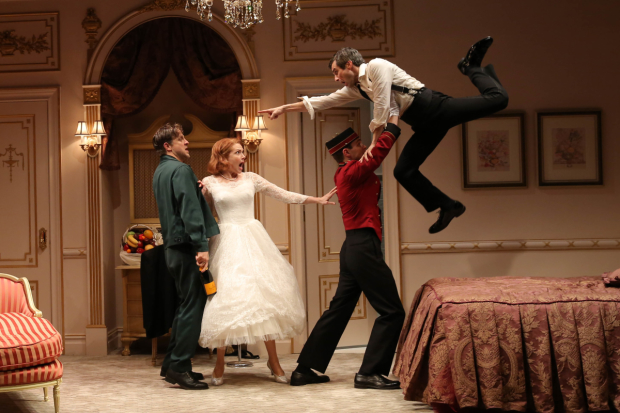
(© Carol Rosegg)
Four of the most dreaded words in the English language are: "We have to talk." In life, as in Nicky Silver's new play, This Day Forward, at the Vineyard Theatre, this sentence is a harbinger of bad things to come. It's even worse when it happens to be uttered on your wedding night.
"We have to talk" is the first thing that Irene (Holley Fain) says to her new husband, Martin (Michael Crane), as they enter their room at the St. Regis Hotel in 1958. Hours earlier, the pair tied the knot, but Irene has a secret: Despite saying "I do," she still has feelings for Emil (Joe Tippett), a former flame who runs a gas station. As Martin and Irene argue — and Martin attempts to salvage their relationship — Irene announces her plans to run away with Emil. Cut to 2004, when Noah (Crane) and his sister Sheila (Francesca Faridany) struggle to deal with the misery and failing memory of their aging mom, Irene (June Gable), as she fights to recall the events of what should have been the happiest night of her life.
This Day Forward has many of the great hallmarks of Silver's canon: an acerbic, dark family comedy that unexpectedly veers from farce to drama within a single line of dialogue. There's also a Jewish-Mother-From-Hell character. Yet the play never stops feeling like a second-to-last draft, one with a few great surprising scenes and a handful of predictable ones that are still a bit rough around the edges.
Director Mark Brokaw does what he can to guide the company into performances that are more cohesive than the text, but no one pushes the comedy or the drama far enough to stand out. Only Tippett seems to land the laughs, as a variation on the harmless dummy character that has become his signature. Meanwhile, Gable has the unfortunate task of tackling a role that was likely written with frequent Silver collaborator Linda Lavin in mind.
While the narrative may be struggling, the lavish-looking physical production remains the most arresting element of the show. Designer Allen Moyer creates two very different versions of everything to reflect the time and social changes of the period, taking us from a pink-hewed 1950s hotel room to a sleek 2000s Manhattan living environment. Kaye Voyce's costumes ably explore the fashions of then and now. David Lander's lighting appropriately juxtaposes the bright nature of an apartment with huge windows and the dimness of a place with none.
Audiences familiar with Silver's canon know that his best-loved works have a danger to them, one that isn't ever on display here. All that's left is a neutral two-hour effort that goes down easy, even when it shouldn't.








